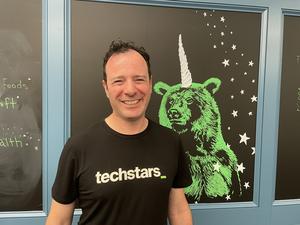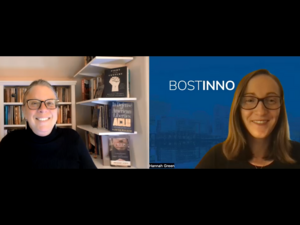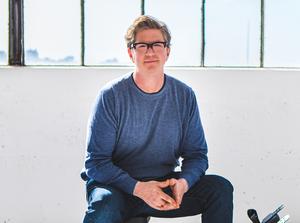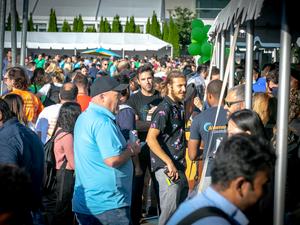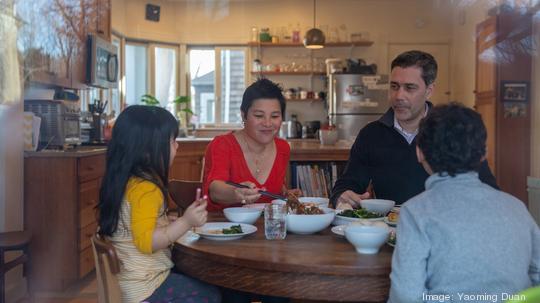
Dorchester resident Elaine Chow looks at a pair of chopsticks and sees more than wooden utensils. To her, they are the building blocks of her new business, a material to create more sustainable products and a way to inspire other entrepreneurs to protect the environment.
Chow is the owner of the first East Coast franchise of ChopValue, a company that is turning used chopsticks — which are usually destined for landfills — into furniture and other home goods. The franchise has been collecting chopsticks from Boston restaurants over the past six months and will have the grand opening of its Charlestown factory at the end of October.
“Let’s set out not to make stuff, which is cool, but let’s set out to inspire other creative people, other entrepreneurs, to do other things that could potentially divert things that are headed for the trash and make something really cool out of it,” Chow said.
A ‘Covid midlife crisis’
A first-time entrepreneur, Chow left a 20-year career in nonprofit management to start her ChopValue franchise. She was most recently chief human resources officer at the national nonprofit Year Up. Chow, 44, said she was feeling increasingly anxious and passionate about sustainability when YouTube’s algorithm fed her a video about ChopValue, a company that originated in Vancouver, Canada and was founded by Felix Böck.
Coincidentally, Chow had taken up woodworking during the pandemic. It had been a while since she pursued something creative. Chow had originally worked in the performing arts after graduating from Bates College.
“I’m very committed to the things I was doing in HR like talent development, career development, things like that, and doing something with your hands and doing something creative. It just felt like the right time in my life to come full circle with that,” Chow said.
Chow took more than a year to complete due diligence on ChopValue and its business model
She also spent time reflecting on her own needs. Ultimately, she said the potential impact she could have through ChopValue outweighed any nerves about starting her own business.
“It’s scary to leave an executive-level job and a paycheck and go borrow a ton of money and go into business for yourself and be responsible for other people’s livelihoods,” Chow said. “And essentially take no salary myself until, hopefully, we’ll be able to do it within a year.”
A local, circular economy
Chow purchased her franchise in November 2021 and began her search for a factory location. The vacancy rate for industrial space in Boston is in the single digits, which forced Chow to push back her business’ launch from this summer to the fall. Finding a location accessible via the MBTA was also important, Chow said, because she wants to be able to hire people who don’t have cars and have school groups visit the factory.
As she searched for space, Chow made the rounds to local restaurants to build partnerships and collect chopsticks.
Chow said she would drop her two kids off at school, put down the back seats of her car and drive around to restaurants. She soon had more than 100 restaurants collecting their chopsticks and giving them to her each week. Her partners include China Pearl, Wagamama, Koreana and Shabu Zen. Chow collected 900 pounds of chopsticks a week for six months.
In this hard work, Chow said also found a chance to reconnect with her Asian heritage. Her parents owned a Chinese restaurant growing up.
“It just felt like a really cool connection back into who I am and where I’m from and getting to know these people, getting to know their names…really building that relationship with them felt amazing,” Chow said.
Setting up shop
Chow finally found a landlord in July and put those 15,000 pounds of chopsticks she’d collected into production after Labor Day.
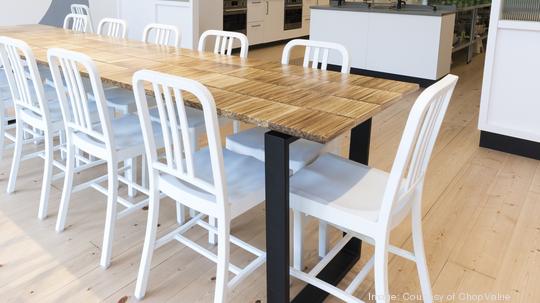
The entire production process takes place in her Charlestown factory, Chow said, including sorting the chopsticks, dipping them in water-based resin and baking them overnight to remove most of the water. Then the chopsticks are put into a hot press which turns 300 individual chopsticks into one eight inch by eight inch tile of a new composite material, Chow said.
“We can cut it up and make smaller items, like coasters, or we can cut it up and glue it together to make larger items, like tables or desks,” Chow said.
ChopValue will sell its products online to individual customers. Chow said anyone who wants to order should use the code MADEINBOSTON to make sure the chopsticks and products come from the Boston franchise.
But the larger vision is to sell to companies or universities who have net-zero targets to meet.
“While most of the focus for net zero is through clean energy, as it should be, I don’t think there’s enough focus on sustainable procurement and how can procurement of carbon negative, highly sustainable materials really help toward your net zero equation,” Chow said.
Sign up for the TechFlash e-newsletter, your free twice-weekly source for tech, startups and venture capital news in Greater Boston.
